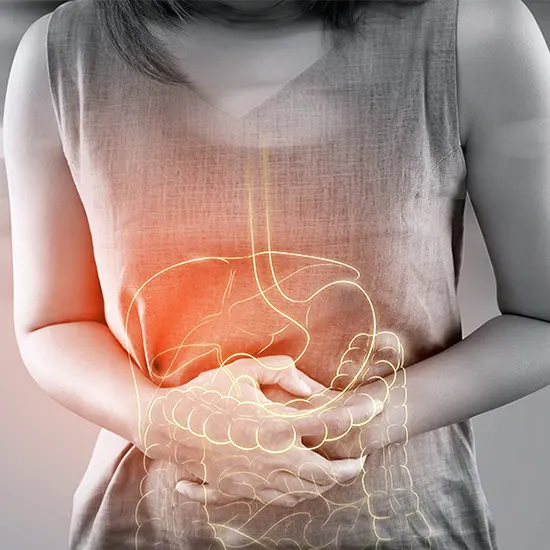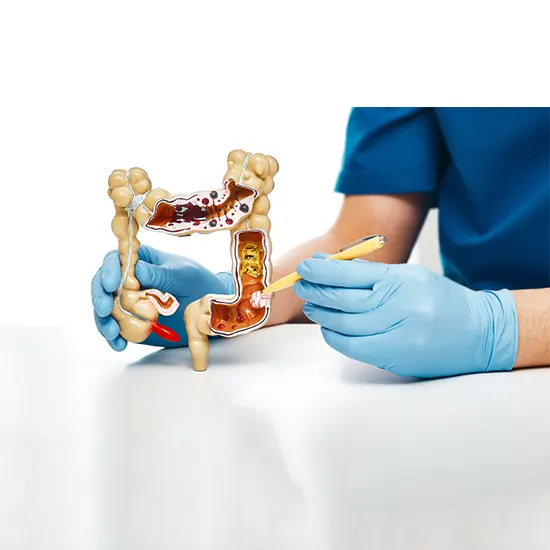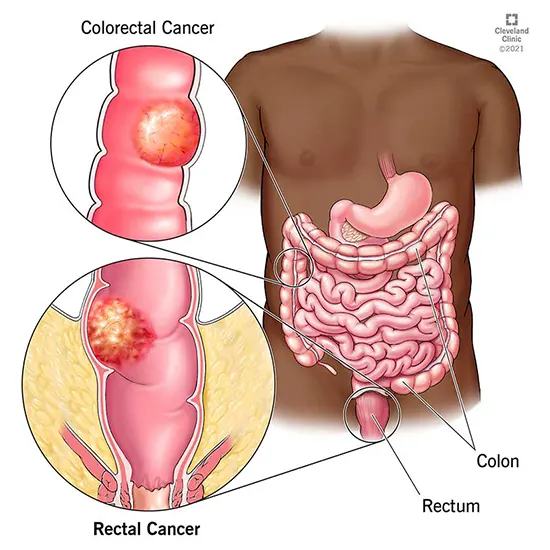
Colon and Rectal cancer are two types of cancer that affect the colon and rectum, which are parts of the large intestine. Colon cancer usually starts as a small, noncancerous growth called a polyp that forms on the inner...
Colon and Rectal cancer are two types of cancer that affect the colon and rectum, which are parts of the large intestine. Colon cancer usually starts as a small, noncancerous growth called a polyp that forms on the inner lining of the colon or rectum. Over time, some polyps may develop into cancer if they are not removed. Rectal cancer, on the other hand, starts in the rectum, which is the last 6 inches of the large intestine that connects to the anus. Like colon cancer, rectal cancer may also begin as a polyp.
Both types of cancer have similar risk factors, including age, family history, inflammatory bowel disease, and certain genetic syndromes. Certain lifestyle factors, such as a diet high in red and processed meat. Lack of physical activity, obesity, and smoking may also increase the risk of developing colon and rectal cancer.
Types of colon and Rectal cancer
Colon and rectal cancer can be classified based on the type of cell from which cancer
originates, as well as the location of the tumor. Here are some types of colon and rectal cancer.
Adenocarcinoma: This is the most common type of colon and rectal cancer, accounting for about 95% of cases. It develops from the glandular cells that line the inner surface of the colon and rectum.
Carcinoid tumors: These are rare tumors that develop from the hormone-producing cells in the colon and rectum.
Gastrointestinal stromal tumors (GISTs) : These tumors develop from the cells that support the structure of the colon and rectum.
Lymphoma : This is a type of cancer that originates in the lymphatic system, which is part of the immune system. It can affect the colon and rectum, although it is rare.
Sarcoma : This is a rare type of cancer that develops from the connective tissue cells in the colon and rectum.
In addition to these types, colon and rectal cancer can also be classified based on the location of the tumor. Colon cancer can occur in different parts of the colon, including the ascending colon, transverse colon, descending colon, and sigmoid colon. Rectal cancer can occur in different parts of the rectum, including the upper, middle, and lower rectum. The type and location of cancer can affect the treatment approach and the prognosis of the patient. Therefore, accurate diagnosis and staging are important for determining the best course of treatment
Stages of Colon and Rectal Cancer
Colon and rectal cancer is staged based on the size and extent of the tumor, as well as the degree to which it has spread to lymph nodes or other organs. Accurate staging is important for determining the best course of treatment and predicting the prognosis for the patient.

Here are the stages of colon and rectal cancer.
- Stage 0
- Stage 1
- Stage 2
- Stage 3
- Stage 4
Stage 0 : Also known as carcinoma in situ, this stage refers to abnormal cells that are only present in the innermost layer of the colon or rectum and have not spread to nearby tissue or lymph nodes.
Stage 1 : Cancer has grown through the innermost layer of the colon or rectum into the middle layers but has not spread to nearby lymph nodes or other organs.
Stage 2 : At this stage, the cancer has enlarged along the colon or rectum's middle layers but has not spread to nearby lymph nodes or any other organs.
Stage 3 : Cancer has spread to lymph nodes but has not spread to other organs
Stage 4 : Cancer has spread to other organs, such as the liver, or lungs, or to the distant lymph nodes.
The stages of colon and rectum cancer are further divided into substages based on the size and extent of the tumor and the number of lymph nodes involved. The treatment options for colon and rectal cancer depend on the stage and other factors, such as the patient’s overall health and medical history. Surgery is usually the main treatment for early-stage colon and rectal cancer.
Symptoms of Colon and Rectal Cancer
Colon and rectal cancer may not cause symptoms at its early stage. This is the reason, why regular screening is crucial for early detection. However, as the cancer of both colon and rectal grows and progresses, it causes the following symptoms such as:
- Change in the bowel habits such as diarrhea, constipation, or change in stool consistency.
- Rectal bleeding or bloody stool, which may appear red, maroon or dark, or tarry.
- Abdominal discomfort or pain, which may be cramping or feeling of fullness or bloating
- Unexplained weight loss
- Weakness or fatigue
- Narrow stool
- Abdominal swelling or lump that can be felt in the abdomen
These symptoms can also be caused by other conditions such as haemorrhoids, inflammatory bowel disease (IBS), infection, etc not only caused by colon and rectal cancer. However, if you experience any of these symptoms, especially if they persist for more than a few weeks, it is important to see your doctor for an evaluation. Early detection and treatment of colon and rectal cancer can improve the chances of a successful outcome.
Risk factors of colon and rectal cancer
Several factors can increase a person's risk of developing colon and rectal cancer, including:
Age : The risk of developing colon and rectal cancer increases as a person gets older, with most cases occurring after the age of 50.
Personal or family history of colon or rectal cancer : People who have had colon or rectal cancer or polyps in the past, or who have a family history of these conditions, are at higher risk.
Inherited genetic mutations : Some inherited genetic mutations, such as Lynch syndrome and familial adenomatous polyposis (FAP), can increase the risk of colon and rectal cancer.
Inflammatory bowel disease : Chronic inflammation of the colon or rectum, such as in ulcerative colitis or Crohn's disease, can increase the risk of colon and rectal cancer.
Diet : A diet that is high in red and processed meat, and low in fruits, vegetables, and fiber, may increase the risk of colon and rectal cancer.
Obesity : Being overweight or obese can increase the risk of colon and rectal cancer.
Smoking : Smoking cigarettes can increase the risk of colon and rectal cancer, as well as other types of cancer.
Sedentary lifestyle : Lack of physical activity and a sedentary lifestyle can increase the risk of colon and rectal cancer.
Alcohol consumption : Heavy alcohol consumption may increase the risk of colon and rectal cancer.
Causes of Colon and Rectal Cancer
Colon and Rectal cancer is caused by the uncontrolled growth of abnormal cells in the colon and rectal. While the exact cause of colon and rectal cancer is not fully understood. There are some risk factors have been identified that can increase the risk of developing colon and rectal cancer are mentioned below.

Genetic mutations : Changes in certain genes can cause cells to grow and divide uncontrollably, leading to the formation of tumors in the colon or rectum. Some genetic mutations are inherited, while others are acquired over time.
Lifestyle factors : Lifestyle factors such as diet, lack of exercise, and tobacco use can increase the risk of colon and rectal cancer.
Chronic inflammation : Long-term inflammation of the colon or rectum, such as in people with inflammatory bowel disease, can increase the risk of developing cancer.
Polyps : Colon and rectal cancer often begins as small, non-cancerous growths called polyps. Some of polyps becomes cancerous with the time.
Age : The colon and rectal cancer risk increases with age, Mostly, its occurring is in people over the age of 50 years.
Family history : Having a close relative, such as a parent or sibling, who has had colon or rectal cancer increases the risk of developing the disease.
Advantages of early detection of colon and rectal cancer
Early detection of colon and rectal cancer can have significant benefits, including:
Increased chances of successful treatment : When colon and rectal cancer is detected early, treatment is more likely to be successful. Early detection allows for less invasive treatment options and a greater chance of a cure.
Improved quality of life : Early detection can help to reduce the impact of cancer on a person's quality of life. This can include fewer side effects from treatment and less time spent in the hospital.
Reduced treatment costs : Early detection can lead to less expensive treatment options, as well as fewer treatments needed overall. This can help to reduce the financial burden of cancer treatment for patients and their families.
Increased survival rates : When colon and rectal cancer is detected early, the chances of survival are significantly higher. Early detection allows for timely intervention and a better chance of preventing cancer from spreading to other parts of the body.
Screening for other cancers : Regular colon and rectal cancer screenings can also lead to the detection of other types of cancer, including prostate, breast, and lung cancer. Early detection of these cancers can also have significant benefits, including improved treatment options and survival rates.
Diagnosis of Colon and Rectal Cancer
The diagnosis of colon and rectal cancer usually begins with a physical exam and medical history followed by one or more diagnostic procedures. The tests used to diagnose colon and rectal cancer includes:

Colonoscopy : This is the most common test used to diagnose both colon and rectal cancer. For colonoscopy a thin, long, and flexible tube with a camera, in the end, is inserted into the rectum and advanced through the colon to look for abnormal areas or growths
Biopsy : During a colonoscopy, a biopsy may be taken to remove a small sample of tissue for examination under a microscope to determine if cancer is present in the colon or rectum.
Carcinoembryonic antigen (CEA) : Cancer usually produces tumor markers in the blood. CEA test is recommended to monitor the effect of the ongoing treatment for colon and rectal cancer because, in the case of colon and rectal cancer, the level of CEA becomes high.
Other blood Tests : Blood tests can help detect certain proteins that may indicate the presence of colon and rectal cancer. Doctors usually recommend blood tests to measure the level of chemicals present in the blood because the abnormal level of chemicals in the blood indicates the presence of cancer as well as problems with organs. So, usually Complete Blood Count (CBC), KFT, and LFT are ordered to measure the functioning of organs and the level of chemicals
Stool Test : The stool test may be used to look for blood or other signs of cancer in the stool.
Imaging Tests : Once a diagnosis of colon and rectal cancer is made, the imaging tests such as Chest CT scan, MRI of the Pelvis, and Whole Body PET Scan may be performed to detect cancer and other abnormalities in the colon and rectum as well as other body parts. The imaging tests help in determining whether cancer has spread to other body organs and the stages of cancer. Because the staging of cancer is important for determining an appropriate treatment to slow down the progression of cancer and get rid of the symptoms.
Conclusion
Colon and rectal cancer, also known as colorectal cancer, is a type of cancer that begins in the colon or rectum. The colon is part of the digestive system that absorbs water and nutrients from food, while the rectum is the last part of the large intestine. Rectum connects to the anus, where poop passes out of the body.
It can be prevented easily by using the prevention measures effectively that include maintaining a healthy diet, exercising regularly, avoiding smoking and excessive alcohol consumption, and undergoing regular screening tests for early detection.
Ganesh Diagnostic offers colorectal cancer screening package for detection of colon and rectal cancer at its initial stages and prevent it from spread to other body parts. If you have any query regarding the diagnostic procedures for colorectal cancer, please feel free to discuss with our health counsellors.









